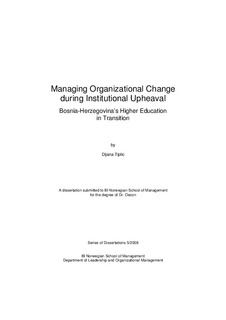| dc.description.abstract | This study focuses on organizational change in non-stabile environments. Non-stabile environments are characterized by dramatic change at societal, economic and political levels caused by, for example, changes in political regime or armed conflict. The literature suggests that higher education plays an important role in assisting such societies through such turbulent and dramatic times. Past research, with both international and national focus, has identified various responses of higher education institutions to a changing environment. However, an explanation as to how different responses occur is missing. In an attempt to address this issue, this study examines the ongoing processes of organizational change and the role of individuals in such processes in detail. While the empirical focus is on change in organizations hosted by an environment that can be described in terms of institutional upheaval, it is recognized that this topic has received limited attention in the field of organizational research. Exceptions to this are studies into organizational change of previously state-owned enterprises in Central and Eastern Europe.
The context for the study is two higher education institutions in Bosnia-Herzegovina - a context characterized by dramatic societal change and transitions over the past fifteen years. This is a qualitative case study of the phenomenon of organizational change. Such change occurring during institutional upheaval is considered as incorporating both episodic and continuous change. By applying strategies of process research, interview and documentary data were analyzed with the help of Qualitative Software for Data Analysis (NVIVO 7).
Findings indicate that organizational change during institutional upheaval can be understood as a dual-motor change process taking place under conditions of strategic ambiguity, and resulting in politicized sense-making. As an outcome, organizations are found to be oscillating between endpoints of change. More specifically, by proposing a model that consists of three phases of organizational change, it has been demonstrated how, in ambiguous situations, influential individuals act as initiators of organizational change. However, upon gaining momentum, the nature of ambiguity changes. Thereby, the change process is assumed to unfold in a cyclical manner between conditions, actions and outcomes. | en |
